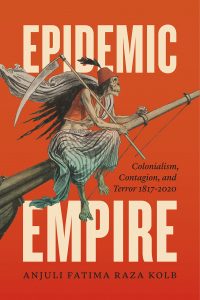Six Questions with Anjuli Fatima Raza Kolb, author of “Epidemic Empire”
Terrorism has often been described as a cancer, an infection, an epidemic, a plague. In her new book, Epidemic Empire, Anjuli Fatima Raza Kolb tracks this persistent trope of terrorism as a “social contagion,” from its roots in anti-rebellion colonial rhetoric through to the global war on terror. Raza Kolb’s demonstrates that the metaphor surfaces again and again at moments of crisis—including the current COVID-19 crisis. We asked the author a few questions about her book.

Epidemic Empire has turned out to be quite prescient. We began preparing the book for publication in early 2020, just before we entered COVID-19 lockdown. How have the events of this past year sharpened your understanding of the themes in the book?
Thank you for asking this question—it’s been on my mind constantly over the last ten months. Also, suddenly, on everyone else’s mind! In the early days of my research, I was getting a lot of pushback on my work’s relationship to what’s casually called “social construct” theory, an effect of deconstruction, which argues that certain seemingly stable ontological categories like gender or race are in fact products of the social. Judith Butler’s monumental Gender Trouble is a good example here, and it’s also a good example of how saying something is socially constructed never means saying it’s ethereal or random or unimportant.
How can “disease” be construed as a social construct? Isn’t there something plainly material about when someone falls sick? I heard these questions a lot. Of course, there are biological realities. I don’t dispute the material existence of viruses, or bacteria, or auto-immune conditions (I have one!). However, what the last year has shown me even more sharply than I could see before is how profoundly human behavior, choices, and even psychology can determine the shape and scope of an outbreak or a pandemic. I feel much clearer now on who is to blame, and the racist logic that motivates them, than I did before. I’m sorry to start on such a grim note. I teach in Canada, but I live in the U.S. What we have done—and it goes way beyond Trump—to our people is unforgivable. The pandemic has been exactly as cruel as we let it be.
Your book grapples with discussions of terrorism, particularly how metaphors of illness and epidemics have entered our political and social consciousness. In your opinion, how has this impacted the response to the pandemic in the US?
The United States is built not only on the violence of extermination and exclusion (we what people?) but also on the fantasy of a “perfect union” modeled on the human form, how the parts are meant to work together. In this metaphor, the national body cannot be a sick body, just as it cannot be a femme body or a racially othered body. In this fantasy—central especially to the Republican party’s mythopoetics—anyone who is struggling or otherly abled is not deserving of assistance or support, or food, of basic rights, even of citizenship. The ADA was passed in 1990. And still, our cities, institutions, and our government have taken only tiny steps toward ensuring accessibility. I mention this because I think it helps to explain the confluence of anti-mask and anti-vax paranoia by many white Americans, for whom the pandemic is either a “hoax” or not applicable to them. It helps to explain how the false sense of immunity from COVID-19 translated into a sense of immunity from the law; we’ve seen a white nationalist attack on the Capitol in which, crucially, the actors believed they were incapable of getting sick (no masks) or getting stopped or subsequently identified and detained. If this is not the outcome of centuries of metaphorizing sickness as foreign, other, raced, imported, insurgent, anti-capitalist, and anti-state, then it is certainly the outcome of our biased anti-terrorism laws.
Your question raises a lot of thoughts for me. The one I’ll end with here is that our country’s extractive social and environmental policies have ensured that Black, Brown, Indigenous, and other poor people bear the brunt of mass suffering. Access to healthy food, clean air, hospitals, and caring doctors, adequate education, safe and spiritually meaningful lives and livelihoods has been deliberately obstructed by elected officials and the corporate donors who fund them. So the racially unequal response to the pandemic is simply an extension of pre-existing criminal neglect, now made more acute. These are difficult things to know; they have kept many more useful people up at night for longer than I’ve been alive. That said, I’ve never tried to make predictions. I’m not a pundit trying to sell a sound-bite. I tried to be responsible to the archive that I thought explained our present snarl of suffering, here and in the zones of our forever wars from the place of my own particular knowledge and experience. The book is a (painful) consequence of that deep study.
How did you become interested in this topic? What led you to write about it?
My parents were in medical school and residency when I was growing up, studying for exams and boards and chatting with their classmates and my aunts and uncles. My mom immigrated to the US from Pakistan, where she was an art student, in 1973. She came for college but this was also in the wave of professional immigration from South Asia that followed the 1965 Immigration Act—a wave that included a lot of scientists. So I was surrounded by medical talk, interesting problems, interpretive questions, and a sense of the relationship between health and the social, diagnosis, and reading. One of my parents’ closest friends from school, Dr. Vicki Sharp, moved to New York to head the AIDS Center at St. Claire’s in 1989. I had no idea what this meant at the time, but the more I learned about the choices and priorities of the adults in my orbit, the more intertwined culture and science seemed to me. Immunology struck me as complex and challenging, and I thought I would study medicine in school. I tell this story in the book as well, so I won’t repeat all of it here, but when the twin towers came down on 9/11, a set of things I had been studying somewhat abstractly—Orientalism, colonial epistemology, third-world movements, decolonial literature—snapped into focus as very much the problem of our present. I was freaked out that people on the news and in the White House kept saying Islam or radical Islamism or terrorism was a contagion, a virus, an epidemic, and I started reading a little more deeply into medical history and colonialism. When it was time to set a research agenda I found I was still interested in these questions. Not only had this discourse not gone away, but it had also blossomed into a full-blown “epidemiological approach to terror” in the US. You see it in the 9/11 Commission Report, even. It was becoming a huge part of US history. How this “epidemiological approach” impacted the wars in Afghanistan and Iraq, the assassination of Bin Laden, how the rhetoric changed in the Obama years—following these threads gave me a lot to work on. Figuring out that this dyad of contagion and Islamist terror started after the 1857 rebellion in India was a bolt-of-lightning moment. My teachers wrote these mind-blowing books about how anodyne knowledge production—normal disciplines like English, or History, or Human Rights Law—is embedded in imperial politics. I tried to follow their lead, and the more I learned, the more pressing it seemed.
While working on the book, what did you learn that surprised you the most? Did your research turn up anything interesting that didn’t make it into the final manuscript?
So many beautiful and maddening surprises! I think the most memorable ones would be the masses of evidence I waded through that showed me how many people were affected by the imperial project in India. Reams and reams of letters and reports by colonial officials who were part of this hideous, oppressive machinery, but who were also saddened by the condition of the people they were tasked with observing, exploiting, and governing, desperate to figure out why people were dying of cholera. The pathos is there in their writings—it’s emotionally confusing, and that tension and ambivalence are also with us today. How is it possible to help under a system of global capital without reproducing and sustaining inequity? It was maybe one of the most difficult discoveries—the beauty of that writing in service of something really terrible. I shouldn’t have been surprised but I was. Something in the volume of it took me aback. The violence and hatred that you see from British people after the Mutiny, the brutality of the French interrogators, and the justice system in Djamila Boupacha’s memoir—which my teacher Joey Slaughter pointed me to—the racism of the 9/11 Commission Report: I was ready for these things. But the tenderness of some colonial field doctors, no. As to what didn’t make it into the book, the biggest thing was a chapter on 9/11 novels, TV shows, and films. I’m glad it’s not in the book. Carefully reading those texts may be something another scholar could spin into critical gold, but for me, it wasn’t nuancing the argument enough to justify keeping it.
What’s the best book you’ve read lately?
It’s been a great year for reading. I think my favorites this year have been Ling Ma’s Severance, a pandemic apocalypse I read in February 2020, strangely, Ross Gay’s Be Holding, which is one of the most searing, soaring books I’ve read in a very long time, Natalie Diaz’s collection Postcolonial Love Poem, which I read right before lockdown and it brought a love of life and movement and bodies back to a very scary time. Roxane Dunbar Ortiz’s An Indigenous Peoples’ History of the United States blew my mind in every good way and is so much in conversation with the work I was trying to do in Epidemic Empire but with completely different geography and archive. Erika Lee’s The Making of Asian America. Mike Davis’s Late Victorian Holocausts. Galina Rymbu’s Life in Space. Terrance Hayes’s To Float in the Space Between, a soft, brilliant book about the writing life and Etheridge Knight. I just started reading Timothy Brennan’s Places of Mind: A Life of Edward Saïd and it’s gorgeous and fun. Karla Cornejo Villavicencio’s The Undocumented Americans, especially the chapter called “Ground Zero.” You said book! Ten is the least possible.
Where will your research and writing take you next?
I’m working on a few projects. The big ones are a collection of poems after Allama Iqbal called Janaab-e Shikva [Watchqueen] and a book-length documentary poem I am researching now on the Indus Waters Treaty of 1960. I am working on some translations from the Urdu, but not sure where they’ll go yet. The next academic book will be on special commodities including water, dilating on water privatization, and scarcity in neo-colonial spaces. I mention this because someone recently asked me “what’s your next book on, I want to be prepared!” All I could do was apologize. The archive and the texts I’m working with are important and heartbreaking. I’m hoping I can contribute to the conversation about imperialism and ecological catastrophe in a helpful way. It’s not totally separate from the work I did in Epidemic Empire: hygiene, ownership, therapeutic empire, they’re all in the new book again in one form or another, but I still have a lot of reading and studying to do.

Anjuli Fatima Raza Kolb is associate professor of English at the University of Toronto.
Epidemic Empire is available now from our website or from your favorite bookseller.